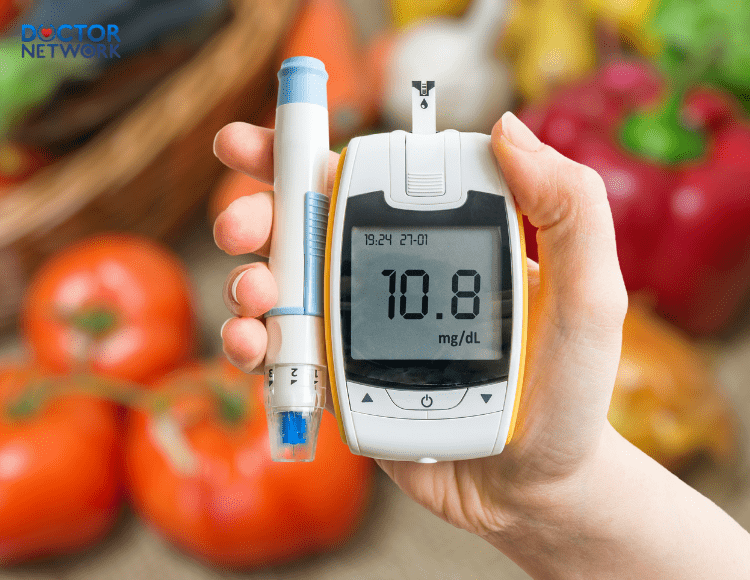Diet plays a crucial role in managing diabetes. A nutritionally balanced diet can help stabilize blood sugar levels and safeguard the health of individuals with diabetes. So, what should diabetics eat? Please read the following article for more information!
What is Diabetes?
Diabetes is a condition in which the body cannot balance the amount of glucose in the blood, leading to elevated blood sugar levels. There are two main types of diabetes: type 1 and type 2.

Diabetes is one of the prevalent health conditions in today’s society
1. Type 1 Diabetes
The primary cause of type 1 diabetes is damage to the beta cells in the pancreas, where insulin is produced. Insulin is a vital hormone that regulates blood sugar levels by allowing cells in muscles, fat tissues, and the liver to absorb glucose for energy.
Causes of type 1 diabetes include immune system impact, where the immune system mistakenly attacks and destroys beta cells, leading to decreased or halted insulin production. Genetic factors also play a role in type 1 diabetes.
2. Type 2 Diabetes
Type 2 diabetes often occurs in adults, and its primary causes are a combination of genetic factors and lifestyle choices. Genetic predisposition increases the risk of type 2 diabetes.
Unhealthy lifestyles and imbalanced diets contribute significantly to the development of type 2 diabetes. Factors such as weight gain, lack of physical activity, and consumption of sugary and fatty foods can contribute to the development of this condition. Additionally, some people may produce enough insulin, but their bodies are unable to use it effectively, a condition known as insulin resistance.
In summary, the causes of diabetes may vary depending on the type of diabetes and individual factors. However, maintaining a healthy lifestyle and regular check-ups can help reduce the risk of developing type 2 diabetes or related conditions.
Symptoms of Diabetes
- Increased thirst and water consumption.
- Increased frequency of urination and urine volume.
- Persistent fatigue and muscle weakness.
- Eating more but losing weight.
- Reduced vision and blurred vision.
- Gum inflammation.
- Slow-healing wounds.
What Should Diabetics Eat?
For individuals with type 2 diabetes and those with prediabetes, restricting carbohydrates (starches and sugars) is crucial to avoid sudden spikes in blood sugar and control saturated fat intake. Their diet should be designed to provide a stable amount of sugar for the body, promoting balance and stability. So, what should diabetics eat?
1. Carbohydrate Group
Whole grains, legumes, brown rice, and vegetables should be prepared by steaming, boiling, or baking instead of frying or sautéing. Starchy vegetables like sweet potatoes should be consumed in moderation, and rice intake may need to be reduced.

What should diabetics eat? – Suitable grains and cereals for individuals with diabetes
2. Protein Group
Fish, lean meats, skinless poultry, lean cuts of meat, and legumes should be prepared using simple methods such as steaming, boiling, or stir-frying to reduce fat content.
3. Fats and Sugars Group
Unsaturated fats like soybean oil, sesame oil, fish oil, and olive oil are preferred in the diet.
Foods to Avoid for People with Diabetes
- Limit white rice, bread, noodles, tapioca, and roasted tubers.
- Avoid foods high in saturated fat and cholesterol that increase the risk of heart disease.
- Avoid fatty pork, organ meats, poultry skin, cream, coconut oil, sweet treats, jams, syrups, and carbonated drinks.
- Minimize consumption of dried fruits and fruit preserves due to their high sugar content.
Principles of Eating
- Divide meals into multiple small portions throughout the day to prevent sudden blood sugar spikes.
- Eat at regular times, avoiding excessive hunger or fullness.

Eating at scheduled times aids in controlling blood sugar
- Do not change the structure and amount of daily food too much and too quickly.
- Engage in physical activity after meals and avoid a sedentary lifestyle to support diabetes management.
What should diabetics eat? These principles should be followed according to the advice of a physician to control blood sugar and prevent complications of diabetes. In addition to a daily diet, individuals with prediabetes and diabetes should focus on exercise and physical activity, coupled with maintaining a well-structured lifestyle (such as sleeping and waking up at regular times, eating on time, and avoiding late-night snacks), as these factors can impact metabolic processes and worsen the condition.
Kiểm Duyệt Nội Dung
More than 10 years of marketing communications experience in the medical and health field.
Successfully deployed marketing communication activities, content development and social networking channels for hospital partners, clinics, doctors and medical professionals across the country.
More than 6 years of experience in organizing and producing leading prestigious medical programs in Vietnam, in collaboration with Ho Chi Minh City Television (HTV). Typical programs include Nhật Ký Blouse Trắng, Bác Sĩ Nói Gì, Alo Bác Sĩ Nghe, Nhật Ký Hạnh Phúc, Vui Khỏe Cùng Con, Bác Sỹ Mẹ, v.v.
Comprehensive cooperation with hundreds of hospitals and clinics, thousands of doctors and medical experts to join hands in building a medical content and service platform on the Doctor Network application.























